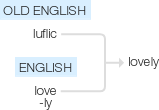Lovely
Old English luflic (see love, -ly1).
wiktionary
From Middle English lovely, luvelich, lufli, from Old English luflīċ, luflīc(“amiable, loving, lovable”), equivalent to love + -ly.
From Middle English loveliche, luveliche, from Old English luflīċe(“lovingly, amiably, kindly, dearly, with good will or love, willingly”), equivalent to love + -ly.
From Middle English lovely, loveli, lofli, lovelike, lovelic(“praiseworthy; laudatory”), equivalent to lofe + -ly. Cognate with Dutch loffelijk(“laudable, praiseworthy”), German löblich(“commendable, laudable, praiseworthy”), Swedish lovlig(“permissible”). More at lofe, love.
etymonline
lovely (adj.)
Old English luflic "affectionate, loving; loveable;" see love (n.) + -ly (1). Sense of "lovable on account of beauty, attractive" is from c. 1300; in modern use "applied indiscriminately to all pleasing material objects, from a piece of plum-cake to a Gothic cathedral" [George P. Marsh, "The Origin and History of the English Language," 1862]. As an expression of delight, 1610s.
